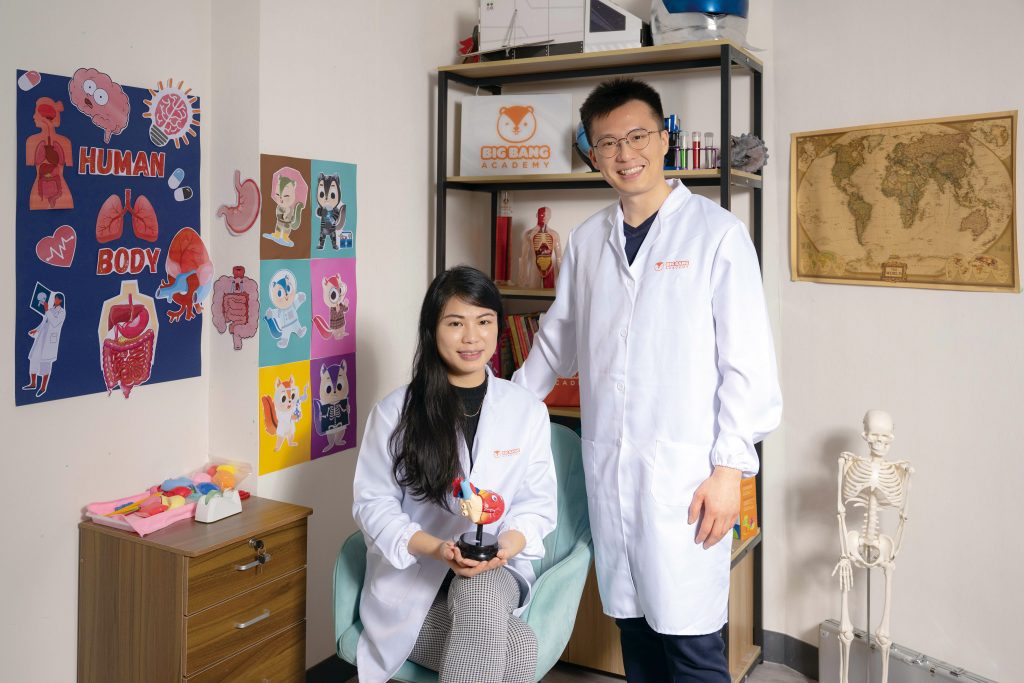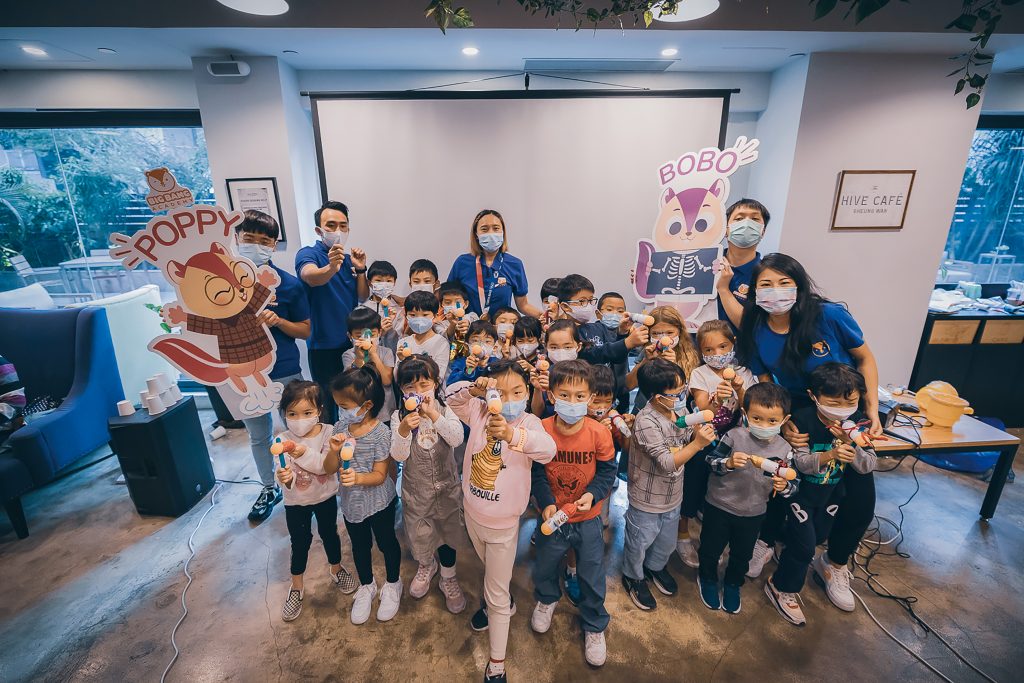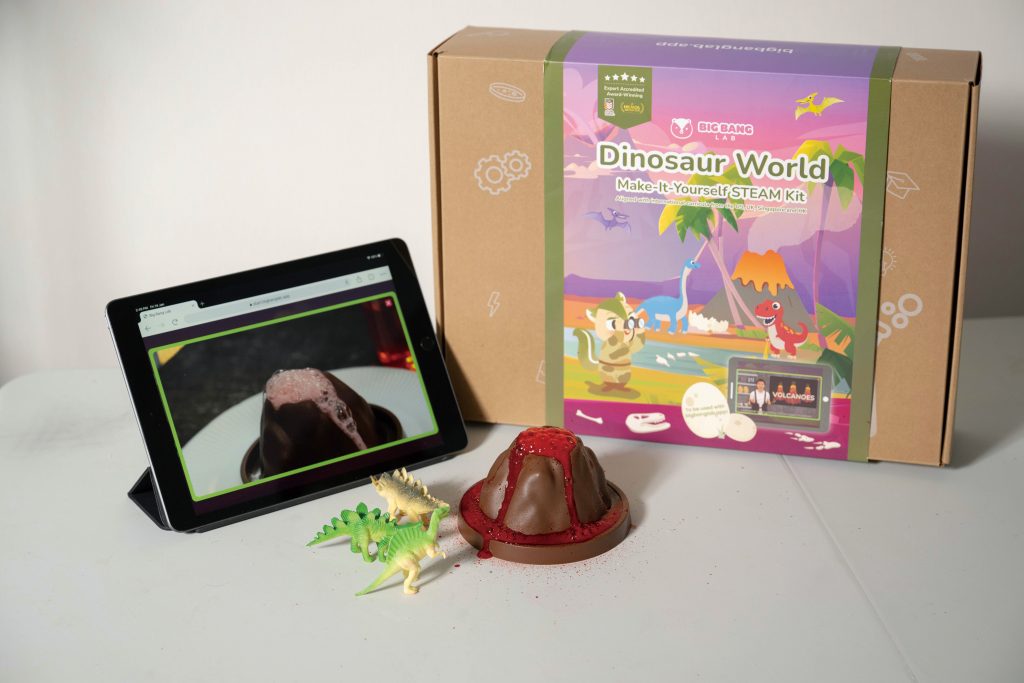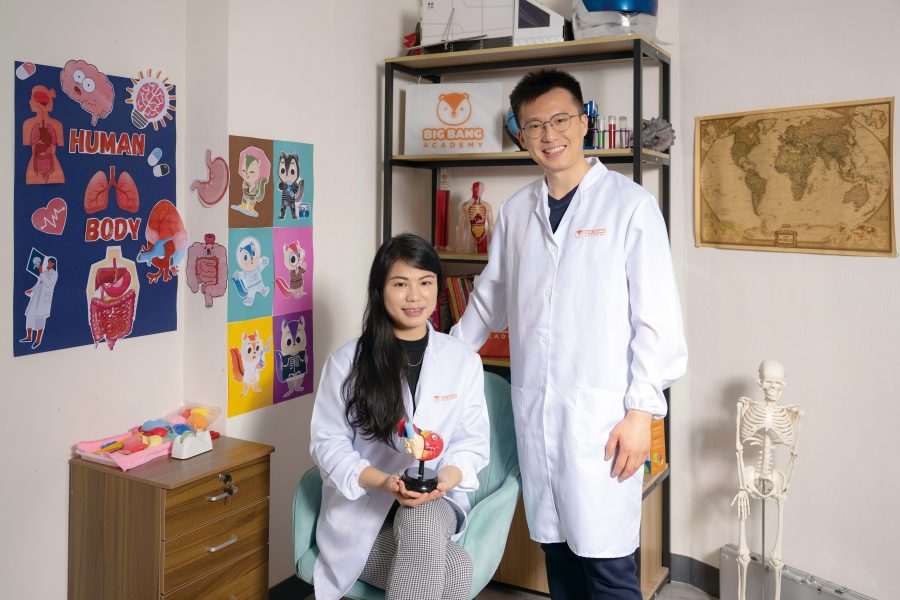Hong Kong locals Sarah and Nixon studied engineering and biology at the University of Cambridge. Driven by their passion for science, they co-founded Big Bang Academy in July 2020 to offer STEAM classes to children aged three to eight. Their lessons must check off three main boxes: they must be as captivating as movies, as fun as theme parks and as systematic and educational as classroom learning.

Giving up high-paying careers for science education
The Cambridge alumni started their careers in finance and reunited a few years later. Realizing their strong passion for science, they started by teaching parttime and eventually launched Big Bang Academy to share a scientist’s thirst for
knowledge and insatiable curiosity with children in Hong Kong. Nixon says, “The path we chose is rare for Cambridge alumni. Had we pursued stable paths of an iBanker, doctor or lawyer, we would be guaranteed stable and high salaries, but life would be much less meaningful. When society needs bright minds in science, where can we find them? Our goal is not to turn every child into a scientist, but to introduce science and to instill in children scientific thinking that ought to be beneficial for our society in the future.”
Since Sarah and Nixon had never worked in education, they had to pick up every aspect of running the academy – such as technology, talent recruitment and fund management – from scratch. According to Sarah, entrepreneurship is not as cool as it seems! Despite the challenges, their scientific brains were key to implementing STEAM education in Hong Kong. Nixon elaborates on the benefits of scientific thinking: “Those who have been trained to think scientifically tend to go an extra mile to set goals, propose hypotheses, create and test predictions, conduct experiments, as well as collect and analyze data. Business projects are very similar to scientific experiments. In fact, scientific thinking can be applied to every aspect of our lives as cognitive training aids all sorts of learning and allows us to overcome all challenges. I cannot guarantee that scientific thinking can be applied to all careers, but at least it gives you a clear goal and direction.”
Science is not just about coding or robotics
The mention of STEAM often conjures the subject’s more popular coding and robotics. Nixon, however, believes these two streams are too advanced for children. “The foundation of science is natural sciences and engineering as a number of today’s technologies are founded on engineering thinking,” he adds. “We can better grasp scientific knowledge if we take on the engineering mindset and the five steps of the scientific method.”
Instead of the more popular STEM, Big Bang Academy adds an extra A – which stands for art – into its STEAM curriculum. The art and science streams used to be distinct subjects – how are they related? Nixon explains, “Scientific training values logical thinking, but the human brain is both logical and innovative. By including ‘art’ in STEM, we hope children can learn science and art in parallel. Visual arts are common in science: for instance, the human body and atomic structure can only be understood via images. Under the umbrella of science is not only experiments, but also visual arts knowledge which are especially useful during data analysis and building scientific models. We hope parents understand that art is not unrelated to science.”
Science is like a vast ocean, and children aged three to eight should not focus on the depth but breadth of knowledge. Sarah thinks that parents sometimes place children in silos based on their knowledge of their little ones. For example, they may presume their kids only enjoy art and language, or science and coding. “Children’s brains are vastly capable and we should not limit their potential. Even if some children enjoy reading books or dancing, they can still excel in scientific thinking: again, art and science are not mutually exclusive.” By teaching the main branches of science such as physics, chemistry, biology, environmental science, earth sciences and astronomy with a comprehensive and systematic curriculum, Big Bang Academy hopes to show children sub-fields like marine biology and pathology in biology. Sarah and Nixon believe that if children find their passion, they will pursue the subjects on their own.

on their own.
Hard knowledge cannot guide children towards bright tomorrows
When discussing the current trends in education, Sarah and Nixon predict that hybrid learning of both online and physical classes will stay for the next five years even after COVID-19. Sarah says that physical classes are irreplaceable because students need to socialize and interact with others instead of learning purely online. “In a class of 30, each student has different interests and learns at a different pace. Students do not need to be coerced to learn, and teachers are not familiar with every piece of knowledge under the sun – this is why online learning is sometimes better than physical classes when teaching hard knowledge. The classroom, therefore, becomes a place for students to interact, hold discussions, share and learn in groups.”
Traditionally, parents expect schools and interest classes to relay as much hard knowledge as possible. Yet, Sarah and Nixon point out that hard knowledge alone can no longer fulfil children’s needs in the future. Sarah adds, “60% of the careers today may become obsolete by the time our children grow up. Nowadays, many want to work in cryptocurrency trading or visual arts, which were nonexistent fields when we were young. Nobody knows what the world will be like in two decades, so what is the value of hard knowledge? Instead, children’s motivation to keep learning and thinking will be the most valuable. Learning STEAM allows them to cognitively prepare for future challenges.” Nixon stresses that knowledge is easily accessible while thinking skills are useful for life.
For the same reason, Big Bang Academy’s curriculum has been constantly improving since its debut, not just to better cater to children’s needs, but also to construct a bridge between young scientific minds and the future world. Education of tomorrow will involve topics – such as the popular NFT and blockchains – that are unfamiliar to parents but are covered by Big Bang Academy. The Academy also co-organizes offline activities such as a tour of more than 200 students to Prenetics, a COVID-19 testing laboratory, to teach them about viruses and genetic testing as well as to raise public awareness of science.

experiments at home.
For children to overcome their fear of making mistakes, parents must first learn to let go of embarrassment
Sarah and Nixon say a major perk of learning science is that children can overcome their fear of making mistakes. Sarah points out that children retain knowledge better and quicker by making mistakes – each error leads to a new piece of information. “The education system in Hong Kong generally values grades, but this does not promise success. Children who have never experienced failure lack determination to succeed; only by overcoming their fear of making mistakes could children cultivate resilience,” she states. Nixon thinks that parents’ impact on children is exigent: “Parents fear the embarrassment of ignorance when they cannot answer their children’s questions about science. However, parents should be honest with their children that they do not know everything, and that there is no shame in that. No one is omnipotent. When parents encounter a subject they are not familiar with, they can discuss it with their children and work out the answers together. Scientific thinking encourages children to overcome their fear of making mistakes. I hope parents can teach by example and cultivate scientific thinking with their children.”
Although pursuing STEAM education is a difficult journey, Sara believes obstacles can also be opportunities. “The potential for the development of STEAM education in Hong Kong is much bigger than that in other countries. We are excited about the many possibilities that lie ahead. We want to be pioneers like Apple.” Big Bang Academy has a big vision: besides reaching their educational goals, they hope to spread the gospel of science, turn STEAM into a household subject and promote scientific developments in society. “Science can solve many social issues like overpopulation, climate change and pollution. By connecting STEAM with these issues, children will understand their causes and impact on humans. With empathy, they will realize that science is a tool to help others and solve problems.”
Big Bang Academy is now hosting STEM Academy on “AIA Foundation Online Wellness Playground”. The programme features human anatomy, such as the functions of the digestive and respiratory systems, as well as crafts and experiments in every class to deepen students’ knowledge and understanding of science. Please log in to www.AIAF-wellness.org to register for free weekly lessons and revisit STEM Academy’s fun classes.

